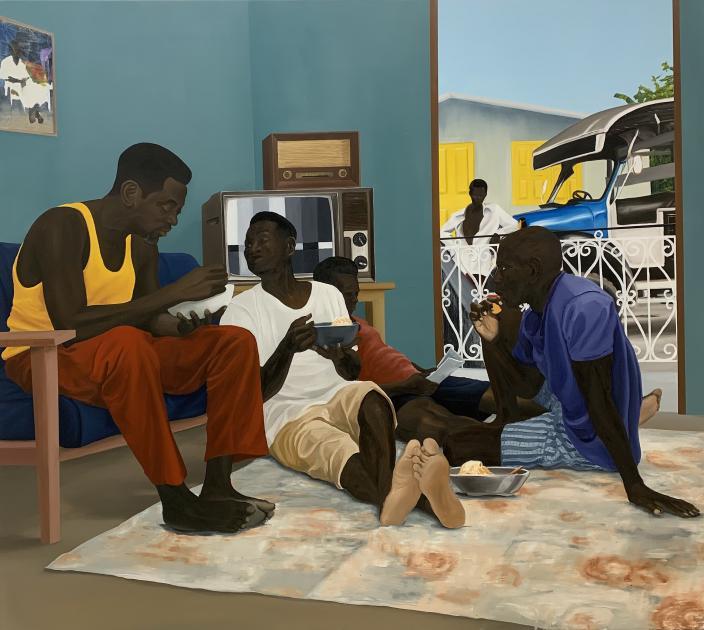©️ Image by Peter Uka
“At least you’re eating now,” Tunde says with a smile. He sits on the living room carpet with his legs crossed, a small bowl of eba and egusi soup in his hand. He holds it close to his chest, so that no drop of oil can escape from his fingers or mouth and smear his white t-shirt. His eyes are fixed on Femi, who sits on the couch beside him.
“Wetin man go do nau?” Femi replies without looking up. He is staring despairingly at the bowl of food in his hand. Three of his best friends are in his living room, trying to cheer him up, one way or the other, yet he can’t stop thinking about her. Renike. The woman that he thought was the love of his life.
“You gats hustle up, bro,” Amigun speaks with food in his mouth. His bowl sits next to him, besides Tunde’s feet.
Peter, the eldest of the three, is the only one that isn’t eating or speaking. He just sits there, near the door, reading his newspapers and listening to their conversation.
“Naija babes these days no send you if you no hold bar.” Amigun continues. “See me na. Why you think say fine boy like me never get any babe till now?”
They all laugh. Amigun isn’t the kind of guy anyone would describe as handsome. Everything about his face is unnecessarily huge; his eyes, bulgy, look like they see ghosts every minute; his nose, the size of a small football; and his ears hang at the side of his shaven head like front tyres of a shiny Volkswagen.
“Las las, na money be fine bobo,” He concludes.
“Leave that thing sha, there are still good women out there,” Tunde argues. “Women who will love you just for who you are. My Funmi is like that. She doesn’t complain when I give her small money. See all the big men that have been chasing her. And she still chooses me all the time. That’s a woman money can’t buy.”
“Every time Funmi this, Funmi that. Make person rest abeg.” Femi says, jokingly, but with a stern look. He takes some soup in his thumb and licks it.
“But let me not lie, it’s not easy. There are things I want to do for her that I can’t because there’s no money. It’s painful sometimes. But I know that one day…” Tunde puts some eba in his mouth and swallows it quickly.
“Exactly,” Amigun starts gesticulating. “There is no romance without finance abi how dem dey talk am. See our brother Femi wey that babe reject because of chronic poverty…”
“Na your papa get chronic poverty,” Femi says, eyes still on his plate.
This time, even Peter laughs, he has a different newspaper now.
“…because of English and suit, she think say na big man pikin or one kain businessman…” Amigun continues, chuckling with food in his mouth. “She follow am go Mama Aloye; dem chop peppersoup, drink coke, she still been no know. Until she follow my man come Bisi Abiodun—street wey be bottom of the bottom class. Na that time her eye clear. She be want get small hope as she see car outside but she no know say na Legedes 440 Femi dey use.”
Tunde chokes in laughter. He places his food on his lap and tries to stop, but he can’t.
“Wait o, let me get you water before you die here,” Peter offers, with a chuckle.
“If I been know, I for no tell you wetin happen,” Femi says to Amigun. He’s now laughing too.
Peter leaves for the kitchen and returns with two cups and a jug of water. He pours some for Tunde who takes a gulp and immediately continues laughing and coughing.
“But why sef?” Femi drops his bowl on the carpet and takes a sip of water from the other cup.
“To be a man these days ehn. My mama for village no go gree me rest with wife wife wife. She no know say na money dey talk now. Where I wan see wife when I no get shishi? And see as I done dey old.” He touches the hair on his chin. The white strands are slowly outnumbering the black.
Peter sits beside the door again. “My brother I feel your pain. Is that not how I was following Anita not knowing she was seeing one chief behind my back? The thing that pained me most was that I was giving her money o; I was always buying stuff for her and her parents. So it’s not even about money sometimes. It’s plenty money. Money stops nonsense. More money ensures that nonsense doesn’t start in the first place.”
“Word!” they all respond
“But come, that Anita shey na Igbo babe?” Amigun asks.
“Yes o, my brother” Peter responds and goes back to his newspaper.
“Na dem.” Amigun folds the last lump of eba in his plate. “My own advice ehn, if you dey date Igbo babe and you get two kidneys, you no serious. You gats sell one, carry the money dey give am small small. Then when you want marry am, you sell your liver. Because the kain wedding list you go see, that kidney money no go reach anywhere. Then, after you marry, anything wey won sup, make e sup. You done marry am.”
“This boy you’re a fool” Tunde says, laughing. Peter smiles behind his newspapers.
“So like this, without money, you no be man for this country. Abi how?” Femi asks, to no one in particular.
“My brother, that’s how it is,” Peter replies. “It’s sad sometimes.”
“So when I get the money now…and I become qualified to settle down, how would I know whether the love is genuine or not? Is real love even real these days?” Femi sighs. “ E be like I go just vex, marry anybody from my village. Anybody wey my mama give me, na she be that. I done tire.”
“But if you want to really look at it ehn…it makes a lot of sense considering how the country is going.” Tunde says, somberly.
“Everybody wants the greenest of pastures. Even in relationships. That’s why most women seek out partners that they know will take good care of them. The way I see it, it’s all down to the patriarchy too. It hurts men more than we realize. Men are taught to be strong, protectors, providers. Women are the weaker vessels bla bla, the ones to be protected and provided for. It’s the way we’ve operated for years so it’s been drilled into everybody. Back then it was strength that determined status, which got you women. Now it’s money that determines status, which in turn, gets you women.”
Amigun sighs and pulls his right sleeve to his shoulder. “Omo, if I been dey that time, I for dey reign o. See muscle nau.”
“As you wowo so, na masquerade you for be,” Femi says.
Everybody laughs.
Amigun has finished eating and is wiping his bowl clean. Femi is a good cook. Even if that girl had rejected him for not being as rich as she thought, maybe one of Femi’s dishes could’ve changed her mind.
“Forget that Renike babe sha. She no get sense.” Amigun licks his fingers. “If she been taste this kind food, she for no leave you.”
“True talk ,” Tunde concurs. He drops his own bowl and reaches for the jug of water close to Peter.
Amigun continues licking his fingers. ” See, Femi, if no girl marry you, me I go marry you. No worry yourself.”
“You dey craze.” Femi says, laughing.
Everybody else joins in. When they stop, there’s a moment of awkward silence. Then, Femi stares at the ceiling as he speaks, more loudly than usual.
“Money!” he says, as if it’s the ceiling fan’s name. “They always say money can’t buy happiness, but that one na lie. Big lie. Money gives you options, man.”
He lowers his gaze and looks at his friends. “Different things will make you happy. Money gives you access to those things. The less money you have, the less choices you have. You gats take wetin life give you. You gats do wetin you fit do to survive. For paper o. All of us just dey chase paper o!”
He looks at Amigun and continues talking, he counts with his fingers. “Money gives you cars…money gives you clothes, shops, trips to America, women…”
He turns to Tunde and Peter who are now looking at him keenly. “…and most importantly, money gives you more money.”
He reclines on the couch with a grunt.
“And most most importantly…” Amigun says. “Money gives you good food!” Then he looks at Femi with pleading, bulgy eyes. “Bros abeg, another round dey?”
There is a roar of laughter. Amigun smiles and picks up everybody’s bowl. Peter shakes his head, unable to hide his grin. Femi hisses and calls Amigun ‘mumu’. Tunde wipes tears from his eyes as he giggles uncontrollably, he almost spills a cup of water on the carpet.
About the Writer

Over Three Bowls and some Newspapers, short fiction written by Collins Undelikwo, is inspired by Nigerian artist Peter Uka’s painting, “Gathering”, used as an image prompt during the Cmonionline Writing Retreat.






